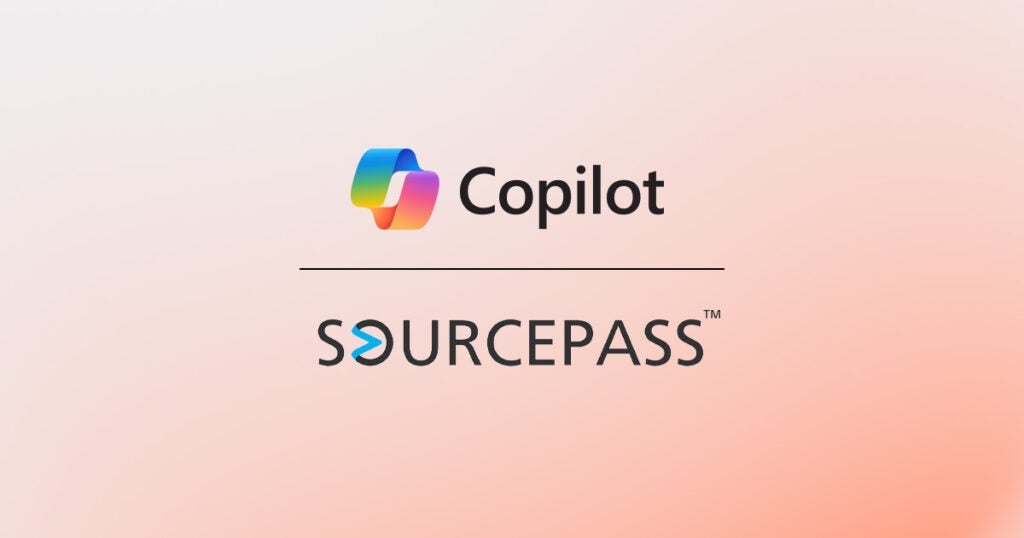At Pax8, we’re honored to be part of a community of partners that drives innovation by promoting the latest technologies that fuel business growth. It’s thanks to partners like Sourcepass, who have been testing Copilot, Microsoft’s AI companion, that we can create a community where we can share information and learn from each other.
It’s especially important to have early adopters test a new solution when it’s a product that is completely new to the market, as is the case with Copilot. By testing this potentially game-changing solution, Sourcepass gives us valuable intel about how to best leverage and sell Copilot for small and medium-sized businesses (SMBs).
Read on to learn what Sourcepass has to say about some of the topics that should be discussed with your clients about Microsoft 365 (M365) Copilot.
The importance of Copilot user adoption
“New technology always favors those who adopt it,” remarked Dan Johnson, Senior Vice President of Western US at Sourcepass. These words ring especially true in the burgeoning era of AI and the launch of Microsoft 365 Copilot this past January. Boosting user adoption will be critical for clients as they see the value of the product and transition from curiosity to purchase.
“We are all excited to learn in this new world,” says Nathan Taylor, Senior Director of Enterprise Solutions at Sourcepass. The biggest tip he gives SMBs is that “you have to encourage people to use it.” Because Copilot is new to the market, there isn’t as much guidance available on its usage as with other cloud solutions; this is why you need to foster curiosity in your clients and encourage them to do the same with their employees.
“Education is key,” Johnson says. He stresses the importance of learning about use cases and empowering people to play with the system to learn it.
One tip Sourcepass offers other MSPs is to create working groups with clients. Not only does this help them learn, but you can also learn from them, since this is new to everyone.
Watch the video below.
What are the security implications of Copilot?
Although there have been security concerns around Copilot and AI tools in general, implementing Copilot can actually result in a stronger security posture. Becoming AI-ready forces us to think about our security more cohesively. And because security threats are becoming more frequent, protecting data is a top concern for all MSPs.
Implementing Copilot can result in stronger security for your organization and your clients. By not only ensuring people have access to the right data, but more importantly, restricting what they don’t need access to, you are creating better data governance for the organization.
“Start with the basics and then work through a security framework,” Taylor recommends. This helps you create a structured cybersecurity format across your entire organization, from the top down. Start with steps such as implementing unified security, identity and access management (IAM), and data management, as well as adopting an industry-approved security framework such as the CIS Controls. Read more about the steps you should take before enabling Copilot.
By taking these steps first, implementing Copilot will help bring maturity to your security posture.
How you can set your clients up for success with Copilot
“It is a technological journey. If you haven’t started it, you need to accelerate it,” Taylor says. The point being that just because your clients are small businesses doesn’t mean they should sit on the sidelines. They need to get started today to succeed with Copilot, and you can help set them up for success with three steps.
Step one is to establish an AI business strategy — and this starts with security. Even small businesses will be able to leverage Microsoft 365 Business Premium, which has built-in security features that will make connecting to Copilot both easier and safer.
Step two would be to set forth strong data governance, or the procedures and guidelines to follow regarding data access, use, and management. Although this isn’t easy, employing a solid data governance policy is worthwhile because it takes the productivity strides you make by adopting M365 in the cloud and adds more protection and guidance around that to securely accelerate your business.
The last step is education and creating small pilot groups. It’s recommended to first start by offering a Copilot readiness assessment. This will help you gauge where your client currently stands and where you both need to focus your time so that they can be AI-ready. Once they are, encourage them to create pilot groups, which should be small but cross-functional, and take part in the feedback they provide so you and your client can make adjustments accordingly.
Once the right feedback has been considered, you and your client can proceed with educating the rest of the organization about how to use Copilot and what you’ve learned from the pilot program. The name of the game remains plotting your clients’ digital transformation to the cloud, getting their security up to date, and getting their applications in step with all their different initiatives. No matter your clients’ maturity levels, their AI journey begins with a single, informed, strategic step.
How can Pax8 help you on the AI journey?
Pax8 is ready to help MSPs and their SMB clients on their AI journey with enablement from a sales or services perspective (or both!). We have built a community with resources, training sessions; and monthly Microsoft webinars, where you can learn from our Microsoft experts and get the resources you need to stay on the cutting edge; and more. Our Copilot experts are always here to help as well. Get in touch to learn more.





